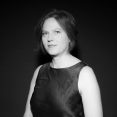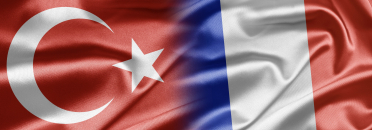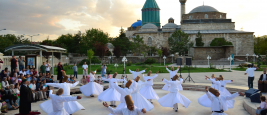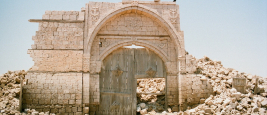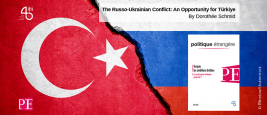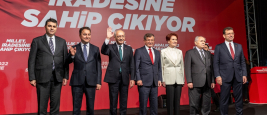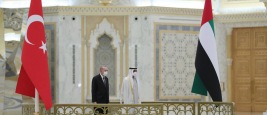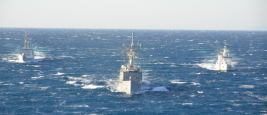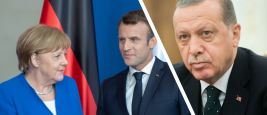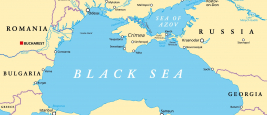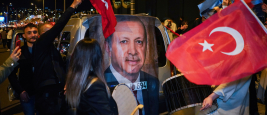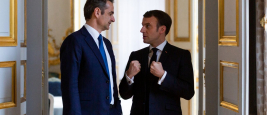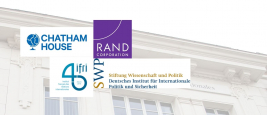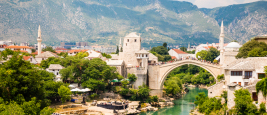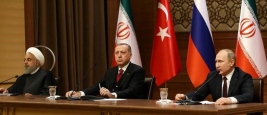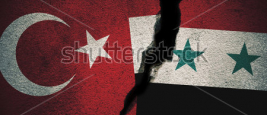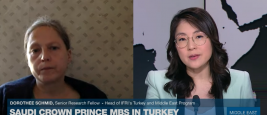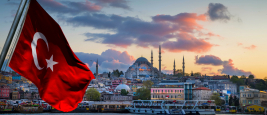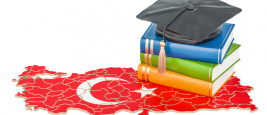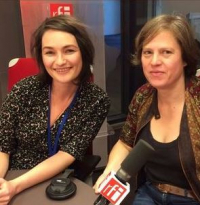While the May 2023 parliamentary and presidential elections looked as a difficult test for the flagging Islamo-conservative Justice and Development Party (AKP), they eventually held on to power, demonstrating their remarkable foothold in the Turkish context. The party notably recorded...

Türkiye
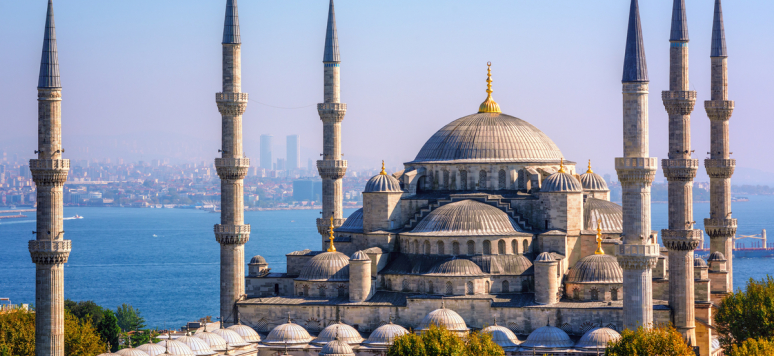
Türkiye today evolves very fast, due to the joint influence of external factors and internal dynamics that are sometimes difficult to grasp.
The beginning of negotiations to adhere to the European Union allowed the Turkish government to pursue a series of political reforms in order to conform to the criteria demanded by Copenhagen. After many years of severe structural adjustment the Turkish economy benefits from outstanding growth rates that confirm its status as a promising emerging market. Turkish civil society also seems to acquire and strengthen an autonomous voice in the debates to come.
However, there are many uncertainties that are here to stay. As this process of change is still unfinished, the permanent state of political crisis comes at the expense of economic stability. Institutional models and political culture are undergoing a phase of mutations whose outcomes are difficult to predict. Experiencing a rural exodus and new forms of social mobility, the Turkish population is aware of the important consequences these profound changes have on the social contract and national consensus. On a diplomatic level, Türkiye is oscillating between the ardent European demands, exercises of power that may lead to a loss in sovereignty, and the other tempting alliances that could strengthen its status as a regional power that cannot be ignored.
Far from simplifying the Turkish mosaic, the intensification of its relations with the European Union seems to complicate it: new subject positions emerge that emphasize the need to create new tools of understanding. We must look at contemporary Turkish reality with a new eye in order to spot these new actors, factors of mobilization and lines of cleavage that weigh on Türkiye’s choices.
Senior Research Fellow, Head of Ifri’s Türkiye and...
Research Fellow, Türkiye and Middle East Program
...Associate Research Fellow, Türkiye and Middle East...
Associate Research Fellow, Türkiye and Middle East Program
...Associate Research Fellow, Sub-Saharan Africa Center and Turkey/Middle East Program
...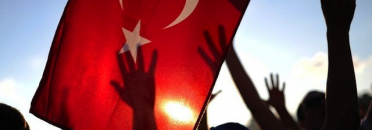
Since the launch of the Opening Plan to Africa in 2003, Turkey's African policy has spread to the whole of the African continent, where its involvement is distinguished by its scope and diversity.
In response to the Ukrainian conflict, Ankara, which had previously developed a special relationship with both sides based on history and economic interests, adopted a balancing strategy of active neutrality.
The year 2023, already marked by a deadly double earthquake in the south-east of the country in February, is the year of the centenary of the Republic, but above all an election year for Turkey.
The upcoming presidential and parliamentary elections in Turkey on May 14, 2023, are expected to be closely contested. Polls suggest that the ruling AK Party-led People’s Alliance will lose its majority in parliament, resulting in a hung lower house.
After the Arab uprisings, Turkey’s relations with Saudi Arabia and the United Arab Emirates (UAE) broke down along sharp ideological lines. While Riyadh and Abu Dhabi sought to preserve the regional status quo by adopting a counter-revolutionary approach, Turkey emerged as an anti status quo,...
In the summer of 2020, the Central and Eastern Mediterranean became the center of unusual tensions between France and Turkey. Given that these tensions were also military, which is uncommon for the two countries, the perception that the French military has of Turkey’s army and its doctrine is...
Since coming into office in 2017, Emmanuel Macron has been the loudest advocate for the development of European ‘strategic autonomy’, which aims at reinforcing the European Union’s geo-strategic independence. Asserting the EU’s role on the international stage, starting with its immediate...
On July 20, 2021, Turkish President Recep Tayyip Erdoğan celebrated with his Turkish Cypriot counterpart Ersin Tatar the 47th anniversary of the Turkish military intervention in Northern Cyprus. This ceremony marks the strategic reinvestment of the Cypriot file by Turkey.
Strategic positioning and energy challenges for Türkiye in the Black Sea Conference
The Black Sea has become a battleground in the Russian-Ukrainian war. While Moscow asserts its ambitions for power at sea and on land, Ankara controls maritime access through the strait. Turkey plays the role of mediator to ensure the security of grain and hydrocarbon...
Turkey after the elections Conference
After more than 20 years at the helm of Turkey, Recep Tayyip Erdoğan has won a historic third term as President of the Republic, defeating Kemal Kılıçdaroğlu, the Kemalist party's candidate, with 52% of the vote, despite being backed by an unprecedented coalition of the entire opposition.
The France-Greece Relationship : A New Strategic Partnership ?
Since 2014, the number of maritime incidents between Turkey and its Greek and Cypriot neighbors has steadily increased. In 2020, at the height of the crisis, Greece obtained the unconditional support of French President Emmanuel Macron, who sought to portray himself as the defender of European...
QUAD 2021 Annual Meeting
Since 1983, the QUAD gathers every year, the SWP, RAND Corporation, Chatham House and Ifri. The QUAD was set up during the Euromissile crisis and brings together European and American diplomats, military officers, journalists and research fellow to debate on current geopolitical issues.<...>
Eastern Mediterranean: Preventing Escalation Les Jeudis de l'Ifri
What is Turkey seeking in the Middle-East? Videoconférence
A videoconference around Dorothée Schmid, head of Ifri’s Turkey / Middle-East Pogram.
Re-thinking Turkish foreign policy in the Western Balkans
In the first of our foreign policy meeting series “Ruptures in the Neighborhood: The Impact of Turkish Foreign Policy in its Neighboring Countries and Beyond,” we will focus on the Turkish foreign policy (TFP) in the Balkans. In line with the overall goal of the series, we will aim to get an...
Turkey advancing in the Middle East Seminar and Round-table Conference
The Syrian imbroglio has arguably proved to be the most consequential foreign policy topics for Turkey in decades, structurally impacting Ankara's vision and priorities as well as its regional engagement.
Turkey and the Middle East: A New (Dis)Order in the Middle East: Stakes for Europe and Turkey Séminaire & Table ronde
Since the collapse of the Ottoman Empire in the aftermath of the World War I, efforts by both regional or international powers to build a sustainable regional order in the Middle East have failed. While some debate on the best conceivable order for the region, others argue that we should...
Iran : The Revolution's Legacy, Understanding the Current Political, Economic and Cultural Dynamics of Iran Séminar & Roundtable co-organized with Lettres Persannes under the Sponsorship of Senator Joël Guerriau
Since the nuclear agreement was reached in July 2015, Iran has returned to the forefront of international relations. However, the complexity of Iranian society remains hardly understandable for Western observers. At a time when both Iran and the world are opening to each other, in order to...
The leaders of Saudi Arabia and Turkey are turning the page on years of strained relations, exacerbated by the 2018 assassination of Saudi journalist Jamal Khashoggi at the kingdom's consulate in Istanbul. Face-to-face dialogue is the order of the day between Crown Prince Mohammed bin Salman...
The EU and Turkey both say they are ready to iron out their differences and step up bilateral cooperation, which could take place in many areas. But Ankara will have to prove its goodwill.
Competing claims have left Ankara isolated. Its efforts to stall projects threaten billions of dollars in investment. Europe’s top diplomat smiled for the camera as he took a helicopter flight over the disputed waters of the island of Cyprus at the end of June.
Turkey has decided to suspend the opening of several French studies departments in its universities, in a context of bilateral tensions after the publication of a "manifesto against new anti-Semitism" last month, calling for the correction of some parts of the Quran. Dorothée Schmid, head of...
Turkey is looking to revive a fragile ceasefire in Aleppo, and the planned evacuation of civilians, which brokered with Russia. But why is Ankara, a staunch opponent of Damascus, interested in helping to create an outcome that would benefit President Assad? Amanda Morrow put the question to...
Turkish President Recep Tayyip Erdogan’s AKP suffered a stunning defeat in the latest parliamentary poll with the party losing its absolute majority for the first time in 13 years. The question now is whether it can hold on to power.
...A l’occasion de sa visite de travail en France, l'Ifri a accueillie le 31 octobre à l’Automobile Club de France, le Président de la République de Turquie, Recep Tayyip Erdogan.
...


